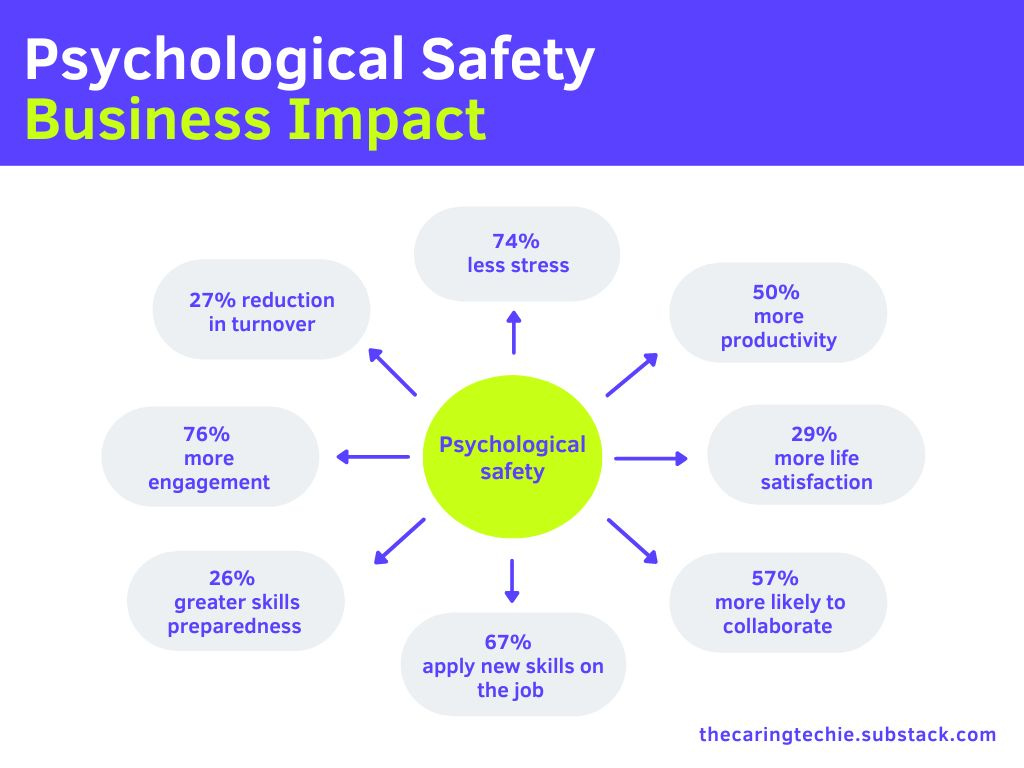
Have you ever felt reluctant to voice your opinion, fearing you’ll get shut down, judged, labeled “negative”, or lose access to further career-advancing opportunities?
Have you felt anxious telling your boss you made a mistake? Were you afraid of being ridiculed or criticized? Or worse, fired?
Do you sometimes feel like you're walking on eggshells at work? Or that the boss is out to get you? Are you unsure of who to trust and who's got your back?
This was me at one point in my career. I remember once I was given the feedback that “for a senior, I ask too many questions”. Another time, I was told by my then-manager that my feedback is weighing them down, and giving them more work. I remember feeling extremely confused and small, and I started second-guessing everything I said until I slowly became quieter and quieter. This is what psychological unsafety looks like.
I learned about (and truly experienced) Psychological Safety during my time at Google. I still remember the day when my manager at the time (hi Divyesh!), sent us a questionnaire and set up a meeting for us to openly discuss ways we could improve as a team. I remember thinking “wow he really cares”. One of the aspects we were asked to score was how comfortable we felt speaking up and voicing our opinions, the essence of psychological safety, so naturally, I rated it really highly. I always felt really safe at Google, I could ask any question, and express my opinions and people cared about my feedback. As a result, I thrived and our team was killing it! Without realizing it, psychological safety became the norm for me.
Experiencing psychological unsafety later in my career felt like a punch in the stomach. Looking back, psychological safety now seems like one of those things that when you have it, you don’t think about it, but when you don’t, it’s an acute daily pain that you carry with you everywhere. No wonder I got burned out (more about my story here).
In this article, my hope is to shine some light on what psychological safety is, how it’s the foundation for innovation and high performance, a leading reason for employee engagement and well-being, and why companies must take it very seriously because it directly impacts the bottom line.

Understanding Psychological Safety
The term psychological safety was coined by Amy Edmondson, The Novartis Professor of Leadership at Harvard Business School. Edmonson describes psychological safety as “a belief that one will not be punished or humiliated for speaking up with ideas, questions, concerns, or mistakes”. Her studies state that psychological safety is a critical factor in teamwork, learning, and high performance.
Google confirmed Edmonson’s findings by conducting its own multi-year study on what differentiates high-performing teams. The results show that it’s not just about how talented, competent, or senior the team is. What matters more is dependability, structure and clarity, the meaning of work, impact, and lastly, the trait that underpins all others, psychological safety.
Google’s definition adds a bit more color. They define psychological safety as “an individual’s perception of the consequences of taking an interpersonal risk or a belief that a team is safe for risk-taking in the face of being seen as ignorant, incompetent, negative, or disruptive”. In a team with high psychological safety, teammates “feel confident that no one on the team will embarrass or punish anyone else for admitting a mistake, asking a question, or offering a new idea”.

A psychologically safe environment is by no means non-confrontational and always agreeable. On the contrary, the point is to have healthy disagreements, even with your superiors, and without the fear of retaliation or negative consequences.
Unfortunately, psychological safety seems to be the exception rather than the rule nowadays and we need to change that. To fully understand the impact it has on people, we need to look at the human brain.
The Neuroscience Behind Psychological Safety
Our brains, and implicitly how well they perform, are context-dependent because different brain regions get activated in different situations. Our worldview, behaviors, and cognitive output differ in different contexts. When in distress, the brain operates from a more primal structure called the amygdala. In tandem, the part that’s responsible for reasoning (aka the prefrontal cortex) becomes inaccessible.
The consequence? We make decisions out of fear and a scarcity mindset; we are afraid to try new things and don’t take risks. We don’t speak up and don’t challenge the status quo. We bottle up emotions and spend precious energy scanning for threats instead of creating or problem-solving. Ultimately, our performance is significantly diminished.
I learned I “ask too many questions” in writing during a performance evaluation cycle. Feeling quite blind-sighted, my brain immediately shifted into a “be careful who you trust” mode. My motivation, engagement, and performance all had to suffer from that moment on.
Performance and Innovation
Psychological Safety is the foundation for innovation and the path to high performance.
The explanation also lies in how the brain operates. When we feel safe, most of our reasoning comes from the prefrontal cortex, the source of creative thinking and learning. We need a psychologically safe brain with a fully functioning prefrontal cortex to achieve high performance and innovation.
In a psychologically safe environment, I got promoted multiple times, successfully delivered on more and more complex challenges, performed better, and was overall much happier.
Employee Engagement and Retention
$600 billion a year is lost on employee turnover. It has been widely researched that job satisfaction and psychological well-being are the biggest predictors of workplace turnovers.
“Knowing that your voice matters and that you’re not stuck in an uncaring, unchangeable machine has a positive impact on well-being”. - Nir Eyal, Indistractable
A psychologically safe workplace promotes employees’ mental health and well-being by supporting open communication, positive emotions, and a sense of thriving in everyday life, leading to a 27% reduction in turnover and 76% more engagement. Also, psychological safety plays an important role in preventing burnout, which is another significant cause of turnover.
Why would any successful business want to waste so much money on something that can be prevented?
Business Impact
Innovation, high performance, employee engagement, and retention have direct consequences on the bottom line.
Data provided by Accenture, Gallup, and Gartner Research all support the same finding: psychological safety has a direct business impact.
Google’s research, according to this article, provides even more data: “the sales teams with the highest level of psychological safety outperformed their revenue targets, on average, by 17%. Those with the lowest psychological safety underperformed by 19%”. If psychological safety made such a difference at Google, imagine what it could do for your company.
Obviously, the main motivation for psychological safety should be the desire to build a fair and ethical workplace, where people feel respected and appreciated. Beyond that, the results will speak for themselves, making psychological safety a business proposition.
Next Steps
The “If you see something say something” philosophy only works if people feel safe to do it. If it gets them in trouble, they just won’t. This self-preservation mechanism is natural, but it will hold us back.
We need to collectively create work cultures where we support each other and feel free to speak up because psychological safety is the foundation of functional healthy cultures.
There’s plenty of evidence and research to support why it is crucial to get “psychological safety” right: our brains need it, while businesses can benefit in quantifiable ways. Why not take advantage of it?
Have you experienced psychological safety in your workplace? What do you think are ways we could create a psychologically safe culture? I’d love to hear from you.
Until next time,
Your caring techie
P.S.: In the next article we are talking about how we can all make our workplace more psychologically safe
Many thanks to everyone else who provided precious feedback on this article and especially Prasha Dutra and David Bulgar.
Did you like this post? Here’s how you can support me:






Love this post Irina 🥳 I realized I totally have psychological safety in my current team! Everyone is very understanding and supportive, and I feel totally free to admit mistakes and misunderstandings (which I do frequently). This helps my growth as well as my life happiness too of course! And I just feel safe at work. One thing I think helps to create it is to have informal one-on-ones where you talk honestly about career development and what’s going on in your life, and not just focusing on the tasks of the day every time you talk to your manager!